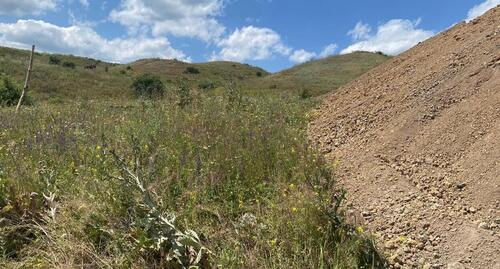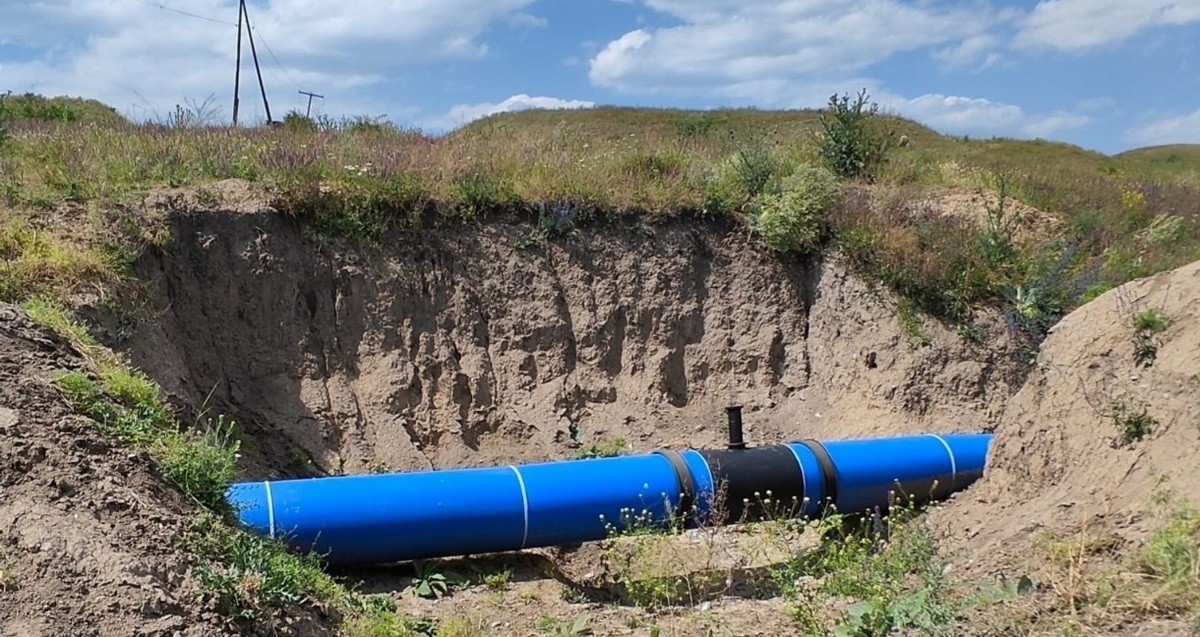Archaeologists demand to save the cultural layer of ancient burial mounds in Kabardino-Balkaria
Officials, in violation of the law, failed to organize archaeological work on burial mounds before the construction of the Baksan group water pipeline began, and after the destruction of these objects, they did not allocate funds for the declared security and rescue measures, historians said.
The fact that the construction of the Baksan water pipeline led to the destruction of archaeological sites of regional and federal significance: burial mounds in the area of the village of Islamey, Baksan and Kyzburun settlements, Zayukovskaya and Kyzburun burial mound groups from the late Middle Ages, Alan settlements, and Kabardian burials of the 14th-17th centuries were damaged during the work, was written on June 23 by the author of the blog “Nalchik and Neighbors. The Caucasus in Search of Justice” on “Caucasian Knot”. “In places where heavy equipment passed, there are shards of ceramic dishes and other artifacts (...) The examination recognized the “security” plan as complying with the requirements of the law, however, as it turned out later, construction was started before the examination results were received - without conducting field work, without organizing the presence of an archaeologist,” the publication says.
Vladimir Lobanov, a historian from St. Petersburg, who contacted federal authorities in connection with significant damage to ancient burial mounds and settlements in Kabardino-Balkaria during the construction of a water pipeline, received a response from the republic’s Ministry of Construction. It follows from the officials’ message that after the mounds were damaged, a tender was announced for “security and rescue measures.”
At the end of May, Lobanov sent a letter about the situation in Kabardino-Balkaria to the President of Russia, stating that the authorities of the republic, in accordance with the expert assessment of the Baksan Group Water Pipeline project, were obliged to conduct “rescue scientific research archaeological field work” before the start of construction. However, construction began “without conducting archaeological work, including in areas that needed to be saved by archaeological excavations,” the letter says, a copy of which is at the disposal of the “Caucasian Knot.”

“After my appeal, which was addressed personally to the head of the Kabardino-Balkarian Republic, I received a response from the Ministry of Construction and Housing and Public Utilities of the Kabardino-Balkarian Republic, which again states that there are no problems with preserving cultural heritage during the construction of the water pipeline. That a search is currently underway for a contractor for archaeological work, although this is already a violation, because it should have been done before the start of construction. In addition, only a small part of the objects appears in the procurement documents, they must be examined and saved,” Lobanov told a correspondent of the “Caucasian Knot”.
The scientist suggested that the head of the republic did not even see his appeal, and there is a conspiracy between the contractor for the construction of the water pipeline and the authorities to avoid fulfilling the requirements for the protection of cultural heritage sites. In a letter addressed to the President of the Russian Federation, he asked to identify officials who are concealing the fact of violating the law, and who previously did not plan to finance full-fledged archaeological work and did not carry it out. Attached to the letter are responses to appeals previously sent by him to the authorities of Kabardino-Balkaria.
At the stage of developing the design documentation, archaeological work was not carried out “due to time constraints and the lack of budgetary funds for archaeological research,” the response from the Ministry of Construction of Kabardino-Balkaria states, in particular.
The ministry allocated about 35 million rubles for “security and rescue measures,” but this amount “is not enough to carry out archaeological work even on one burial mound group,” while the scope of work under the competition assignment covers 22 burial mounds and three settlements. “Therefore, not a single application was received for the announced tender,” a local historian told a “Caucasian Knot” correspondent on condition of anonymity.
The specialist is confident that archaeological work must be carried out, albeit with a delay: excavate the damaged areas, collect all the artifacts, examine them, describe them and transfer them to the museum. "There's a lot of stuff lying around there - ceramics, bronze, and bones," he noted.
We've updated the apps on Android and IOS - now they work without a VPN! We would appreciate criticism, ideas for development both in Google Play/App Store and on KU pages in social networks. Without installing a VPN, you can read us in Telegram (in Dagestan, Chechnya and Ingushetia - with VPN) or use the browser Ceno to bypass blocking. Using a VPN, you can continue reading "Caucasian Knot" on the website as usual, and on social networks: Facebook*, Instagram*, "VKontakte", "Odnoklassniki" and X. You can watch the video of "Caucasian Knot" on YouTube. Send messages to WhatsApp* to the number +49 157 72317856, to Telegram - to the same number or write to the address @Caucasian_Knot.
* the activities of the Meta company (which owns Facebook, Instagram and WhatsApp) are prohibited in Russia.
Translated automatically via Google translate from https://www.kavkaz-uzel.eu//articles/412598

